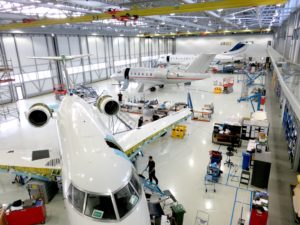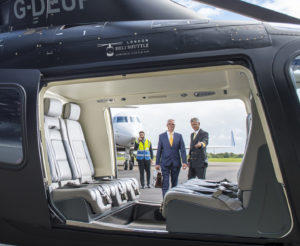Words by Jack Roper
Managers can navigate their companies and employees through the Covid-19 crisis with clear communication and accountable decision-making.
Life’s only certainty is uncertainty and change its only constant. Few expected Covid-19 to hold the world suspended under empty skies, confronting business aviation with existential questions. Surviving a downturn requires resilience, agility and readiness to change. Like their political counterparts, business leaders stand or fall by the mindset they demonstrate and their ability to carry people with them. Those companies which successfully scale back to basics and redefine their goals will be best-placed to capitalize on new opportunities in a post-pandemic world.
“In aviation, there’s always a crisis,” says Dr Karsten Benz, professor for aviation management at Frankfurt University and former chief commercial officer of Austrian Airlines. “Disruption is normal – 9/11, SARS, the financial crisis, the Icelandic volcano. It’s two good years, two bad years, so you must train your people to expect volatility. But after each crisis, a recovery always follows. You must be prepared for when demand returns.”
Agility has been the basis for London Biggin Hill Airport’s successful pandemic response, alongside a broad portfolio of businesses on site. The latter has provided income to sustain it financially while aircraft are grounded.
“Resilience comes from the flexibility to adjust our business model and procedures,” says London Biggin Hill’s commercial director, Robert Walters. “Our diversified aviation ecosystem makes us a healthy business. We do everything except scheduled flights: flight training, cargo flights, military flights, repatriation flights. Our income derives from operational fees correlated to passenger travel, but also property leases.”
Financial measures

FBOs and charter operators with narrow margins must scale back to what Benz calls skeleton mode to survive a three-month business hiatus. “Reducing operations to a minimum reduces market exposure when there’s no demand,” he says. Continued liquidity requires reducing variable costs to zero, then working to mitigate fixed costs. “Go for state aid and renegotiate all your contracts, for instance with aircraft lessors, preserving cash as a scarce resource. It’s about securing the cash position to avoid an insolvency process, applying to court and seeing people you don’t want to see.”
It is a stark reality that smaller operators can sink without trace in a global recession. But those who survive can learn financial lessons and emerge leaner and better-equipped for future downturns. “This pandemic underlines the importance of building a strong balance-sheet to provide financial resilience against three months of zero income,” says Walters. “That’s what outside investors in business aviation will focus on now.”
“We’re seeing airports get back to brilliant basics,” says Sally Jenner director of Alchemmy Consulting. “Scaling back to match lower demand enables more agile leadership and quicker decision-making.”
Jenner believes a crisis provides opportunities to tackle legacy contract issues and make smart decisions, like performing maintenance or infrastructure upgrades while aircraft are grounded. “Companies can take time to really understand their customer’s journey, where the pain-points are and how to overcome them,” Jenner continues. “Organizations tend to layer up complexity, but making changes while volumes are low allows them to regrow more efficiently.”
Weathering a shutdown may require scaling back to skeleton mode, but it is equally essential to keep operational capability alive and be ready to capitalize when recovery comes. “If you dismiss people then business picks up and you have no pilots, you will be isolated,” says Benz. Distributing work between staff on a part time basis, drawing
on state aid and continuing to pay employees’ health insurance can all serve to keep staff connected to the company. “These days, leadership is not just strategies and clear communication. Leadership is protecting your people,” he adds.
Remaining operational during the pandemic mitigates the need for pay cuts and job losses, but for many businesses the downsizing required to ensure survival will inevitably mean redundancies. “Then it’s a matter of balancing respectfulness to those who leave your business with loyalty to those you save,” says Jenner. “Leadership is about behavior. A crisis brings increased scrutiny and if staff see poor behavior, they’ll wonder why they’re staying.”
Crisis communications
Employee communication is crucial in a crisis. Effective communication keeps staff invested in the business. Bad communication can result in a loss of credibility. Benz spells out the key principles: “Firstly, responsibility has to be clear,” he says. “It’s the CEO on the stage, not a deputy. Show your face, have daily video conferences. From the top, everybody follows one message. Nobody should have their own alternative analysis of the threat and opportunities – nobody.
“Give people perspective. Everyone knows the situation, everyone has fears. Say, yes, we’re grounded, but we are prepared to recover and we will be back. Inform people on a factual basis. Be honest and admit to errors.”
Proactive messaging was a cornerstone of London Biggin Hill’s Covid-19 communication’s strategy with CEO David Winstanley delivering weekly video addresses. “We ensured communication and kept employees up-to-date from a business and safety perspective and with our aspirations going forward. No one person knows more or less than anyone else in the business,” says Walters.
When responding to crises, Benz stresses the need for a total airport perspective. Airports which fail to consider the survival of stakeholders and service providers may face a shortage of de-icing, ground-handling or catering companies when operations resume. More than 70 aviation businesses reside at London Biggin Hill. While MROs remained busy with grounded aircraft, charter firms suffered badly. “We’ve allowed tenants to draw down rental deposits to pay their rent, putting money back in their pockets,” Walters explains. “Our Return to the Skies scheme for operational customers slashes the cost of training circuits to keep crews and aircraft current and airworthy.” Such measures aim to ensure the health of the airport’s whole ecosystem.
Covid-19 has created a revolution in remote-working and video conferencing which business aviation must digest. The operational nature of airports precludes most staff working from home, but Jenner anticipates more flexible and blended working for back-office teams post-pandemic. This will require a servant-leadership management style which prioritizes output over hours in the office. “Leaders will set direction but give people freedom to do a great job based on outcomes, not micromanagement. Servant-leadership turns the normal hierarchy upside-down. Rather than CEOs giving top-down direction to the frontline teams who interface with customers, it’s about finding ways to support and enable those teams to be successful.”
Air traffic may not return to pre-Covid levels until 2023. But there may be growth potential in business aviation for those who can adapt and position themselves to capitalize. A desire to avoid crowds, touchpoints and cancellations at large commercial terminals may deliver new customers to business airports.

“There’s an opportunity,” says Benz. “But companies must be clear with their message – as a business-jet operator, we protect you. Eliminating touchpoints or providing pre-flight Covid-19 tests could underline this message.
“The second message is – we’re here for you. Clients must rely on you in the early phase of recovery, as commercial airlines take time to rebuild connectivity.” Should video calling reduce demand for overseas business travel, aviation can compete by selling face-to-face contact as indispensable to building trust and clinching deals. “Business aviation is about trust and reliability,” says Benz. “Airports must be part of the relationship-building process.”
Refreshing aims
Businesses which pare back to essentials in a crisis can emerge clarified and reinvigorated. “Typically, everyone approaches decision-making with conflicting priorities,” says Jenner. “But a crisis makes it much easier to galvanize people around a common goal. We always begin our work with executive teams by trying to nail the performance challenge. Having that spot on the wall which you all recognize provides a laser-focused understanding of what you’re there for.” This renewed sense of direction can enable a business to reframe its future objectives far beyond the germinating time of crisis.
“We’ve reflected on how we operated in the old world and what improvements can be carried forward,” says Walters. “Covid-19 has enabled London Biggin Hill to reset its priorities and refocus its capital development plan.” It will now fast-track infrastructure investment and accelerate its corporate social responsibility program, specifically its generation and use of green power. “The world has slowed down and our lives have refocused,” he reflects. “There’s a reallocation of priorities and people have noticed reduced noise and other benefits of less flying. If we want to remain relevant and resilient, we have to find ways to do business in a responsible and sustainable way.
“We are a global industry, susceptible to global economic events. But we’re also an adaptable industry which always finds ways to absorb the new world and continue doing business. In some respects, the current situation is the best platform we could ever hope for.”





